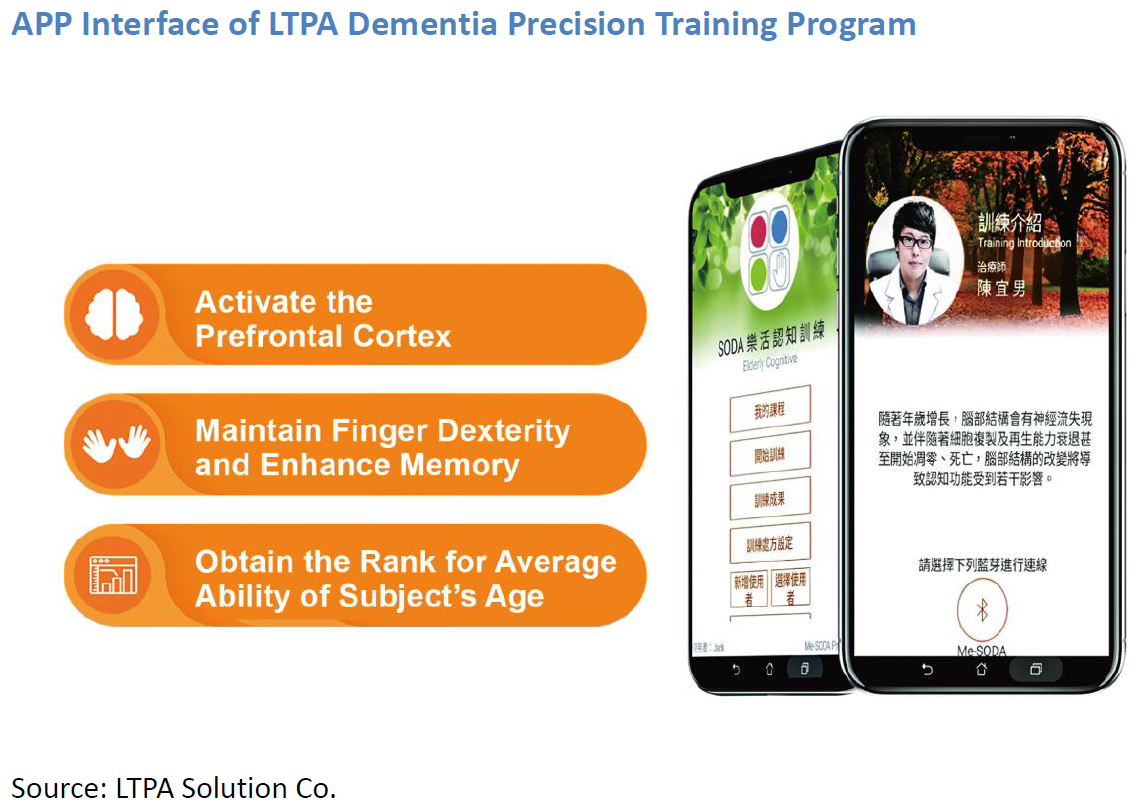Due to the widespread availability of public health services and the advancement of medical technology, the average life expectancy of people has increased, resulting in a rise of aging societies around the world. The number of dementia patients is also growing: one new dementia patient is diagnosed every three seconds, and it is estimated that, by 2050, 150 million people in the world will suffer from dementia. Therefore, people now hope not only to simply “live longer” but to extend their healthy average life expectancy and pursue a successful aging lifestyle with high quality and dignity.
On the other hand, low birth rates will lead to future medical staff shortages and higher healthcare expenses. Introducing innovative technologies (e.g. 5G, AI, the Internet, etc.) to increase medical care efficiency and quality as well as to meet the needs of the elderly and their families is an inevitable trend.
These cutting-edge technologies have gradually expanded the healthcare venue from hospitals to the patient’s home and are applied in a wide range of areas including at-home disease prevention, disease surveillance, and personalized training.
LTPA Training Solution for Dementia Patients
The LTPA (Leisure Time Physical Activity) Training Solution for Dementia Patients was developed by LTPA Solution Co. in collaboration with occupational therapist Chen Yi-nan. The program is a digitalized non-pharmacological treatment for dementia and is used to provide remote AI training courses to dementia patients.
Case managers can deliver remote real-time training to dementia patients with customized non-pharmacological training solutions supplied by the AI
system designed according to individual patient statuses. If there are changes in the patient’s brain and cognition status, the AI system will automatically remind the case manager to adjust the training difficulty and course content. Through 10 to 15 minutes of daily brain activation exercise, patients can maintain cognitive ability, prevent and slow dementia progression, extend their healthy lifespan, and enjoy a successful aging lifestyle.

Photo 1. LTPA Precision Training Program for Dementia Patients app interface (Image source: LTPA Solution Co.)
Building Cross-domain Core Competitiveness
LTPA Solution developed online cognitive training modules based on the idea of brain plasticity and combined them with IoT technology, allowing patients to access instructions easily from case managers at home and complete remote training exercises. Technologies used in this solution include:
Communication and information connection technology: after the patient uses the device at home, relevant data will be directly uploaded to the cloud for long-term monitoring and analysis. The information is also available to the medical staff as a reference for treatment.
Digital twins: bringing in AI technology to predict the user’s risk of cognitive decline and alert responsible personnel if necessary.
Remote digital empowerment: case managers can conduct remote training exercises for multiple patients simultaneously through IoT equipment and video conference devices.
Cross-unit electronic medical record data application: training data is uploaded to the cloud in real time, processed into visual reports, and stored in the patient’s membership account. Medical staff and caregivers at daycare centers, hospitals, and even overseas care locations can manage and access the synchronized data.
This solution could not exist without the team behind it. Its technology is supported by LTPA Solution’s team which has extensive experience in IoT and system integration and over 20 years of market involvement. Professional medical personnel from Changhua Christian Hospital and experts including the Director of the TVGH Dementia Treatment and Research Center and occupational therapist Chen Yi-nan, served as advisors. Well-known Taiwanese artist Action Tang, who is also the Chief Public Relations Officer of LTPA Solution and an advocate of dementia, was invited to act as the spokesperson.
LTPA Solution has already introduced this system to over 20 hospitals in Taiwan, including Far Eastern Memorial Hospital and Kaohsiung Veterans General Hospital, through resource integrations and marketing promotions. Additionally, more than 100 LTC facilities have purchased goods and services, including the Taiwan Nursing Home Association and the Taiwan Cognitive Enhancement Association. The products and services are even exported to overseas markets, such as Kaikaya Daycare Center (Japan) and Healthcare Matters Occupational Therapy Center (Singapore).
Developing Technologies For Long-term Care
As Taiwan enters a super-aged society, ITRI recognizes the technology demand in industries and has invested in related R&D. Examples include the interactive digital entertainment tool which does not require a touch screen. Users simply tap on the projected screen to play the games. ITRI aims to increase the number of users per play without any equipment restrictions. This can reduce the average cost of the facility and let more seniors enjoy the games while preventing brain degeneration and delaying dementia. Another example is the Intelligent Medical Assistant Solution (iMAS). The solution can sync brain cognition and other related data onto the hospital information system (HIS), which increases the hospitals’ willingness to use the platform.
As the number of chronically ill patients is expected to increase in the future, society may also face challenges such as rising care costs and a shortage of care professionals. In addition to developing sub-fields such as Mobile LOHAS, Caretakers Decision Support System, Smart Public-Private-Partnerships, and other key topics, ITRI will continue to lead the transformation and upgrading in Taiwan’s industries as well as develop new applications to extend healthy lifespan, decrease unhealthy remaining life, and eventually build a healthy and resilience society where people can enjoy a successful aging life.

